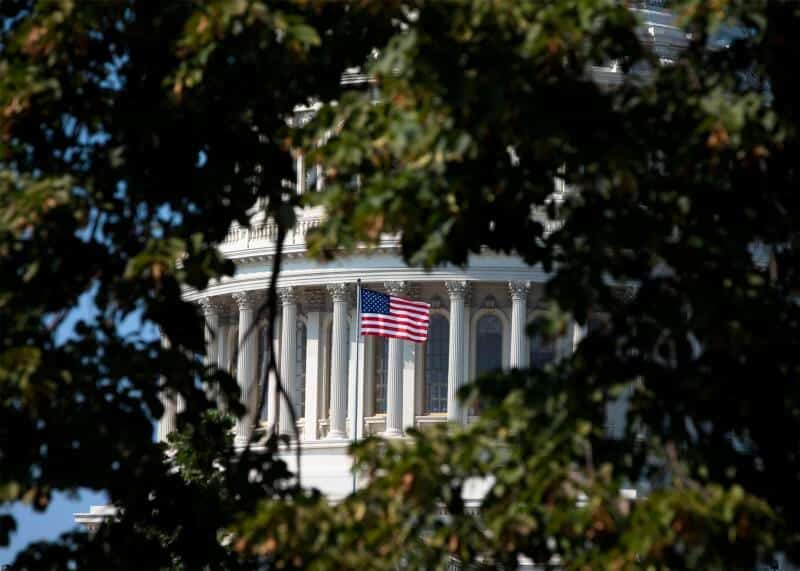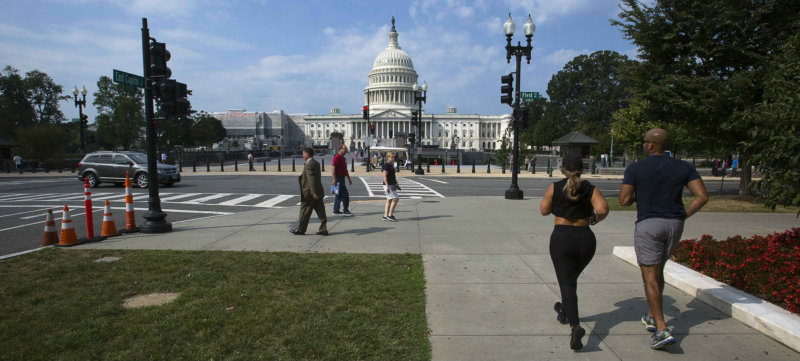
WASHINGTON (CNS) — Catholics — clergy, religious and laypeople in the pews — can utilize the values of their faith to overcome the increasing fiery rhetoric emerging because of the impeachment inquiry into President Donald Trump’s actions, several Catholic observers said.
While watching the caustic animosity that has deepened since House Speaker Nancy Pelosi, D-California, announced the opening of the inquiry Sept. 24, those contacted by Catholic News Service expressed concern that American society is rapidly losing its sense of unity and that it may take years to repair the fractures.
The country is more than political wins and losses, said Arturo Chavez, president of the Mexican American Catholic College in San Antonio, which prepares people for various types of ministry.
“I’ve been just saying (to students) repeatedly that being Catholic is a much bigger commitment and view of the world and of our neighbor than a political party,” Chavez said. “Especially here in the United States, we’re led to believe that there are only two options. As we continue to escalate the rhetoric, those two choices become more and more extreme.
“What I keep telling people is that we have to look at the bigger call that we have as followers of Christ,” he said.
That call from the church — not necessarily the institution as a whole or the U.S. Conference of Catholic Bishops, but individuals working in their circles of family and community — can play an important role in preserving civility, said Jesuit Father Joe Mueller, associate professor of theology and rector of the Jesuit community at Marquette University in Milwaukee.
He stressed that the United States is a not a “winner-take-all” nation.
“We need to recall things like we need to know the truth, we need to pursue justice if there’s been a wrong and to be prudent about it,” Father Mueller said. “We can say that no matter what state of information we have ourselves, we can recall that we are all citizens of this country and we don’t always agree. That doesn’t call into question someone else’s beliefs. We have a civic unity.
“We are all under the same style of representative government. This is something we can all get behind. If the Constitution doesn’t stand for truth and justice, we’ve got a real problem,” he added.
Recognizing the important role individuals play in a democracy calls for the church to “remind us that government should be about the common good and not just about political combat,” said John Carr, director of the Initiative on Catholic Social Thought and Public Life and Georgetown University.
He lamented that the events of recent weeks are continuing the “dysfunction and demoralization of Washington” under which the search for truth becomes secondary to winning.
Carr, onetime director of the USCCB’s Department of Justice, Peace and Human Development, told CNS that Catholics can begin to bridge the divides in their daily life.
“In our own relationships, our own family, our own circle of friends and colleagues, we might try to lower the temperature and focus on the search for truth,” he said.
“The Catholic community is one of the few major institutions in American life that brings people together across partisan, ideology, racial and ethical lines and in times of great division. That in itself is a good thing,” he said.
Such sentiments were echoed by Jim Ennis, executive director of Catholic Rural Life based in St. Paul, Minnesota.
Ennis noted how farmers are particularly independent, but also realize they rely on interdependence for their livelihood. That interdependence has helped the Catholic Church convene rural communities from California’s Central Valley to the Midwest to address various concerns and, Ennis said, such examples can serve the rest of the country to calm the “anger and angst.”
With the church’s efforts rooted in Catholic social teaching and its seven principles that promote human dignity, the foundation for civil conversation that leads to understanding can be built, he said.
Those principles are: life and dignity of the human person; call to family, community and participation; rights and responsibilities; option for the poor and vulnerable; dignity of work and the rights of workers; solidarity; and care for God’s creation.
“A lot of people, especially in Washington, D.C., where it’s needed, come in with their fists up,” Ennis told CNS. “People come in to defend themselves and attack. We can come in there to defuse this situation.”
One observer, however, was more pessimistic about the church’s role and said it may be individual Catholics who can soothe hateful feelings in politics.
Kathleen Sprows Cummings, director of the Cushwa Center for the Study of American Catholicism at the University of Notre Dame, called for Catholics to “each in our own little world work toward a greater understanding and a greater tolerance.”
She expressed concern that Catholics, like others, are more widely influenced by national developments rather than the Gospel or the words of clergy. That has led to polarization in the church that parallels the political chasms in U.S. society, Cummings explained.
What’s her best advice for these times? “Prayer,” she said.
Indeed, prayer has helped people find the truth in their lives, Carr said, adding that he thought more people are praying more intensely at Mass and privately for a solution to the nation’s cavernous political divides.
“It would be important for all of us to hope that we find the truth, whether that benefits our preferred political party or not,” Carr said. “Maybe our church and our faith can remind us there are some important principles at stake here beyond who wins and loses.
“The search for both truth and peace are not in contradiction, at least in our world,” he added.
Chavez at the school in Texas said he found it interesting that the inquiry started as the church approached its celebration of the feast of St. Francis of Assisi Oct. 4. The saint, who focused on increasing the presence of Jesus in his life and treating all life with dignity, offers an example for Catholics to follow, he said.
“He strove for the third way. That’s what Catholics, as individuals and institutionally, should be striving for.”
– – –
Copyright ©2019 Catholic News Service/U.S. Conference of Catholic Bishops.


